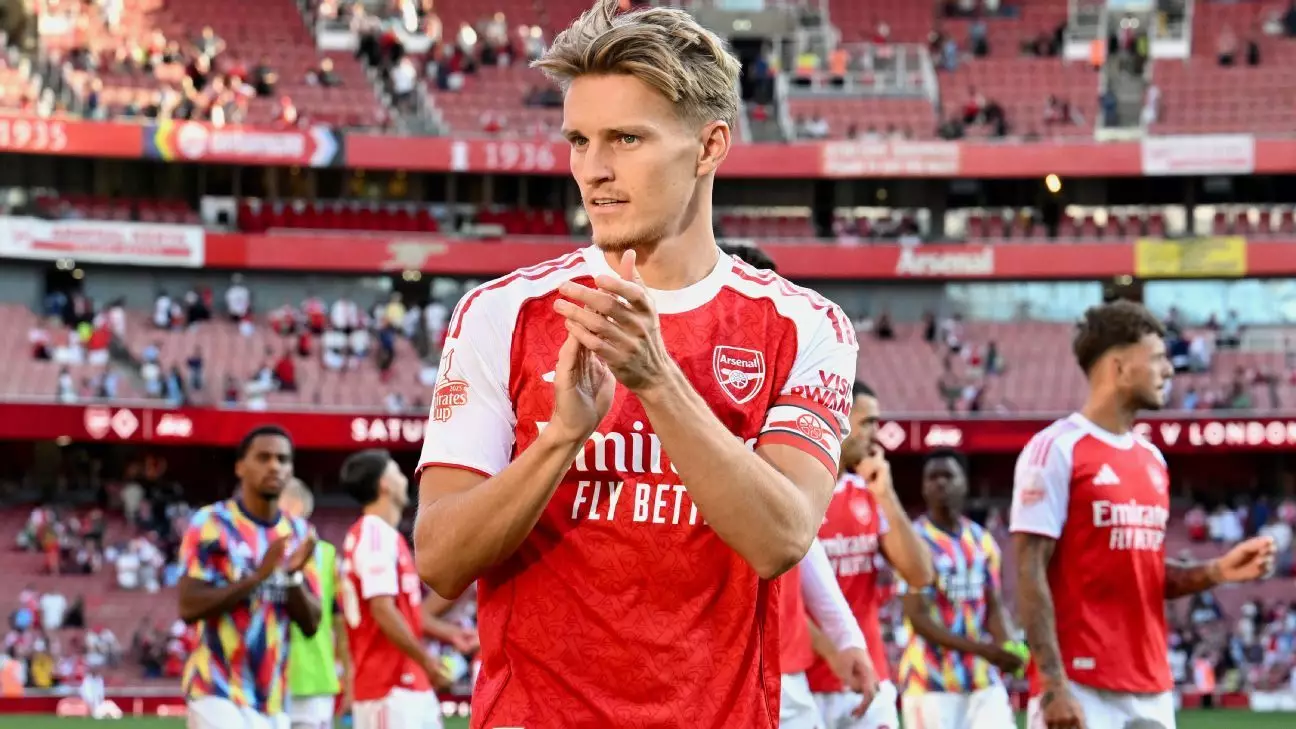In the complex realm of football management, leadership roles often ignite fierce debates, especially when it comes to captaincy. Mikel Arteta’s recent staunch defense of Martin Ødegaard’s captaincy reflects a deeper understanding of team dynamics and leadership integrity. While critics like Tony Adams question the Norwegian’s suitability to lead Arsenal to championship glory, Arteta’s emphasis on collective athlete sentiment offers a compelling perspective. By revealing that the squad overwhelmingly voted for Ødegaard, Arteta underlines the importance of player endorsement in leadership roles—a principle that often gets overshadowed by seniority or external opinions.
This approach showcases a significant shift from traditional command-based leadership to a player-centered model where the voice of the team itself is paramount. Arteta’s transparency in seeking and respecting the players’ opinions indicates a mature and democratic leadership style. Such a model enhances trust, unity, and motivation, which are quintessential for sustained success. It also challenges the often malevolent narrative that a captain must be the most outspoken or physically dominant figure; instead, it underscores emotional intelligence and peer trust as critical attributes of effective leadership.
Furthermore, this stance implicitly questions the validity of outsider opinions dismissing Odegaard. Criticism from former legends like Adams risks undermining team cohesion, especially when it conflicts with the players’ internal consensus. Arteta’s firm stance suggests that leadership decisions should be rooted in the collective will rather than external validation, an approach that might set new standards for managing dressing room narratives.
Leadership Beyond the Captaincy: Evolving Forum for Influence
While Arteta’s support for Odegaard is clear, it invites us to reflect on what true leadership entails within a top-tier squad. The captaincy, traditionally seen as a badge of authority, now appears to be more about influence and the ability to galvanize teammates. Odegaard’s role, as articulated by Arteta, encompasses responsibility, representation, and consistency—the qualities that foster a resilient team spirit.
This nuanced understanding prompts a reevaluation of how leadership is cultivated within high-performance environments. It’s no longer solely about individual charisma but about fostering a culture where players feel empowered to choose their leaders based on trust and performance. This shift aligns with modern leadership theories emphasizing servant leadership and shared responsibility, which are crucial in navigating the unpredictable pressures of competitive football.
Arteta’s decision also reveals a strategic intent to stabilize the team during transitional phases—such as the recent departure of Jorginho—by reaffirming existing leadership structures. Rather than resorting to a quick fix or external appointment, he opts for continuity, trusting in the established consensus. Such stability is vital in a sport where momentum and morale can pivot on leadership authenticity.
The Challenges of Implementing Rule Changes and Maintaining Fair Play
Beyond leadership controversies, Arteta’s comments about the tactical and disciplinary aspects of the game shed light on the broader challenges faced by managers today. The Premier League’s recent rule adjustments, aimed at curbing timewasting and unfair conduct, exemplify efforts to ensure the sport remains fair, fast-paced, and engaging.
Arteta’s acknowledgment of last season’s missteps underscores the importance of adaptability and proactive communication with referees and officials. His call for consistency reflects a desire to create a predictable environment where players can perform without fear of unwarranted punishment. It also emphasizes that clear guidelines and mutual understanding between managers, players, and officials are fundamental to the sport’s integrity.
Moreover, his optimistic tone about the future indicates confidence that these reforms, if properly enforced, will elevate the quality of the league. By advocating for collective effort and adherence to the rules, Arteta subtly highlights that success on the pitch isn’t solely about tactical acumen but also about discipline, respect, and mutual trust. The way he approaches these issues exemplifies a holistic view of team management—balancing strategy, discipline, and fairness.
Strategic Insights for a Competitive Season
Ultimately, Arteta’s unwavering support for Odegaard transcends personal bias; it symbolizes a broader philosophy of inclusive leadership and strategic foresight. In a sport riddled with external pressures and internal complexities, his stance reinforces the necessity of unity and shared belief in leadership decisions. For Arsenal, this could be the foundation upon which they forge a resilient campaign aiming to conquer domestic and European challenges.
This approach also subtly critiques the spectacle of football’s external commentary. While former players and pundits such as Adams wield their influence, effective leadership emerges from within the squad, nurtured through trust and player agency. Arteta’s actions and words serve as a reminder that the true power lies in the collective conviction of the team, not just the labels or accolades that come with given titles.
As the season unfolds, the true test will lie in how well this internal confidence translates into consistent performance and mental toughness. The backing of the squad for Odegaard may seem like a minor detail, but in the high-stakes chess game of football, it could be the strategic move that guides Arsenal toward their ultimate goal: sustained excellence and league victory.


Leave a Reply